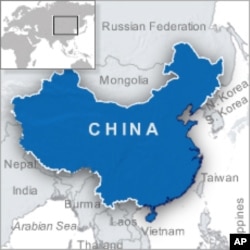A Pentagon spokesman says China has ended its eight-month freeze of military relations with the United States, agreeing to two sets of talks on defense issues in the coming months. The agreement came during a visit to Beijing this week by a senior defense department official.
Defense Department spokesman Colonel David Lapan says China agreed to hold a session of talks focused on naval issues in Hawaii in mid-October, and a broader set of defense consultations in Washington later in the year. These are regular, senior-level meetings that are part of the foundation of the U.S.-China defense relationship.
Lapan could not say what, if any, other meetings and exchanges will resume, but he said this when asked whether the freeze is over.
"I'd say yes. We've agreed to resume these types of engagements," said Lapan.
Lapan says that means U.S.-China military relations are back on track.
"It's back to where we want it to be, which is resuming the mil-to-mil contacts and relationship. And obviously our hope is that that continues, as the thing that we stressed in these meetings was that we need to get away from the 'on again, off again,' he said."
China froze its defense relations with the United States in January after approval of a $6 billion U.S. arms sale to Taiwan. It was the second such move by Beijing in three years in response to such sales, prompting senior U.S. officials to call for an end to such retaliatory steps. They say regular U.S.-China military contacts are needed to avoid misunderstandings as Beijing makes major advances in its military capabilities.
Colonel Lapan says that was the message Deputy Assistant Secretary of Defense Michael Schiffer took to China this week for meetings that resulted in Wednesday's announcement. And Lapan says China seems to have agreed, at least for now.
"I can't speak for them. But they did certainly agree that having these types of regular contacts and building this relationship was key to that trust and to avoid the miscommunication and miscalculation," said Lapan.
The colonel says the possibility of a visit to China by U.S. Defense Secretary Robert Gates was discussed during the Schiffer talks, but there was no decision. Gates had been expected to visit China in June, but China did not allow the visit as part of the freeze.
A report from Beijing by China's official Xinhua News Agency on Tuesday said defense talks will resume, but did not provide the specifics the Pentagon reported on Wednesday.
The Xinhua report quoted Chinese defense official Qian Lihua as telling Secretary Schiffer the two defense establishments will resume exchanges "to jointly promote the healthy and stable development of military relations." But Qian did not commit to an end to retaliatory freezes, saying military relations "face problems" that need to be "solved urgently," and that "safeguarding the stability of China-U.S. military relations should be shouldered by both sides."
That would appear to be a warning that future American arms sales to Taiwan could result in more interruptions of U.S.-China military relations. When the United States shifted its diplomatic recognition from Taipei to Beijing in 1978, it made a commitment to help provide Taiwan with the means to defend itself. In June, Secretary Gates noted that the Taiwan arms sales are not new, and said their impact on U.S.-China military relations depends on whether Chinese leaders "want to make a big deal out of it or not."










